


Copyright 2011 by Prods O. Skjrv
All rights reserved. This book may not be reproduced in whole or in part, in any form (beyond that copying permitted by Sections 107 and 108 of the U.S, Copyright Law and except by reviewers for the public press), without written permission from the publishers.
For information about the Sacred Literature Series and other Yale University Press publications please contact:
U.S. Office:
Europe Office:
Set in Arno Pro by IDSUK (DataConnection) Ltd
Printed in Great Britain by Hobbs the Printers Ltd, Totton, Hampshire
Library of Congress Cataloging-in-Publication Data
Skjrv, Prods O.
The spirit of Zoroastrianism / Prods O. Skjrv.
p. cm.
Includes bibliographical references.
ISBN 978-0-300-17035-1 (cl : alk. paper)
1. ZoroastrianismSacred books. I. Title.
BL1510.S55 2011
295dc23
2011041889
A catalogue record for this book is available from the British Library.
10 9 8 7 6 5 4 3 2 1

The International Sacred Literature Trust was established to promote understanding and open discussion between and within faiths and to give voice in today's world to the wisdom that speaks across time and traditions.
What resources do the sacred traditions of the world possess to respond to the great global threats of poverty, war, ecological disaster, and spiritual despair?
Our starting-point is the sacred texts with their vision of a higher truth and their deep insights into the nature of humanity and the universe we inhabit. The publishing program is planned so that each faith community articulates its own teachings with the intention of enhancing its self-understanding as well as the understanding of those of other faiths and those of no faith.
The Trust especially encourages faiths to make available texts which are needed in translation for their own communities and also texts which are little known outside a particular tradition but which have the power to inspire, console, enlighten, and transform. These sources from the past become resources for the present and future when we make inspired use of them to guide us in shaping the contemporary world.
Our religious traditions are diverse but, as with the natural environment, we are discovering the global interdependence of human hearts and minds. The Trust invites all to participate in the modern experience of interfaith encounter and exchange which marks a new phase in the quest to discover our full humanity.
CONTENTS
1 Zoroastrian Literature
Background
The Avesta and other Zoroastrian literature
2 Creation and the Divine World
Cosmic contrasts and the two Spirits
Order and chaos
Creation
Gods
Demons
The creation of living beings
3 Mythical History and the Zarathustra Myth
Hero-sacrificers of the first ages
4 Eschatology and the End of the World
5 Body and Soul
6 Death, Rewards, and Punishment
7 Ethics
8 Rituals
The Yasna, a ritual re-creation of the world
The Videvdad, a ritual purification of the world
Other rituals
9 On Kingship
10 Doctrinal Issues
Translations
From the Pahlavi texts
From the Old Persian inscriptions
From the Old Avesta
From the Young Avesta
From the Pahlavi texts
Hero-sacrificers of the first ages in the Young Avesta
Hero-sacrificers of the first ages in the Pahlavi texts
Zarathustra and the Gathic characters in the G th
th s
s
Zarathustra and the Gathic characters in the Young Avesta
Zarathustra in the Pahlavi texts
On the actors of the final battles
On the evils that are befalling and will befall Iran
On the resurrection and the Final Body
From the Young Avesta
From the Old Persian inscriptions
From the Pahlavi texts
From the Young Avesta
From the Old Persian inscriptions
From the Middle Persian inscriptions
From the Pahlavi texts
From the Young Avesta
From the Old Persian inscriptions
From the Pahlavi texts
From the Old Avesta
From the Young Avesta
From the Pahlavi texts
From the Avesta and Zand
From the Old Persian inscriptions
From the Middle Persian inscriptions
From the Pahlavi texts
Diverging practices in the Yasna
On right practices and foreign worship
From the Pahlavi books
PREFACE
The only comprehensive collection of translations of Zoroastrian texts is that by E. West in the Sacred Books of the East from about 1900. Since then, the only anthology of Zoroastrian literature in English is that by W. W. Malandra, which, however, contains only Avestan and Old Persian texts. In this book, I have tried to follow a number of key concepts from their earliest appearances in the G th
th s and the Young Avesta through the Pahlavi literature, including, in particular, texts illustrating priestly thinking and discussions about the faith, leaving out many of the better-known Avestan texts, which are included in Malandra's anthology. All the translations are my own, although I have, of course, consulted existing translations and discussions.
s and the Young Avesta through the Pahlavi literature, including, in particular, texts illustrating priestly thinking and discussions about the faith, leaving out many of the better-known Avestan texts, which are included in Malandra's anthology. All the translations are my own, although I have, of course, consulted existing translations and discussions.
Some readers might have wished for more explanations, but the size of the book was limited, and I decided texts were more important. The bibliography contains suggestions for further reading. Additional information on individual terms can also be found in the Encyclopdia Iranica and its on-line version http://www.iranica.com/newsite. West's translations, useful although outdated, together with others, are now on-line, as well, at avesta.org, where texts on rituals are also to be found.
ACKNOWLEDGEMENTS
I am grateful to my long-time friend and collaborator Ursula Sims-Williams for bringing me into this project by suggesting my name and to Malcolm Gerratt for inviting me to do this volume and for his support. I would also like to thank the International Sacred Literature Trust, whose aim is to publish the great songs, poetry, stories and teachings from the spiritual heritage of humanity to enable us to draw upon the spiritual wisdom of the past in developing wisdom for the future. I am grateful for being allowed to be part of this project. Finally, I must thank Yale University Press for producing this attractive volume.
EDITORIAL NOTE
As the abstract vocabulary denoting divine entities is likely to be confusing, such terms are in upper case, e.g., Good Thought (as opposed to a good thought, etc.), Wrath (as opposed to wrath, anger), Tradition (the d n, as opposed to many traditions, etc.). Many of the divine names probably retained their full meaning in the Old Avestan texts and have been translated here. They were probably just names already in the Young Avestan texts, where they have not been translated, for instance, Ahura Mazd
n, as opposed to many traditions, etc.). Many of the divine names probably retained their full meaning in the Old Avestan texts and have been translated here. They were probably just names already in the Young Avestan texts, where they have not been translated, for instance, Ahura Mazd
Next page
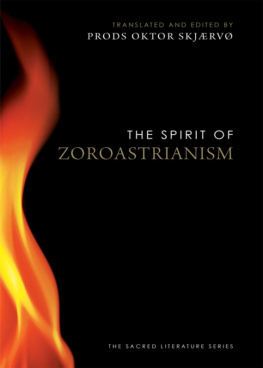


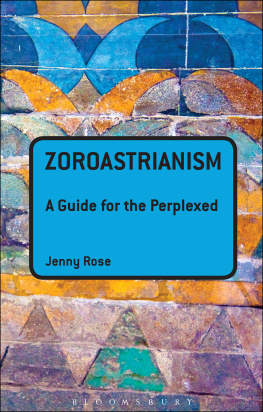
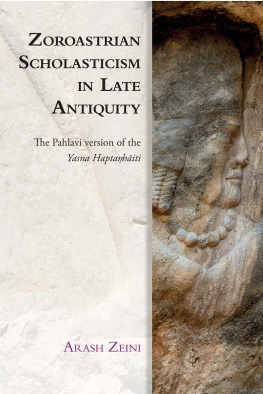
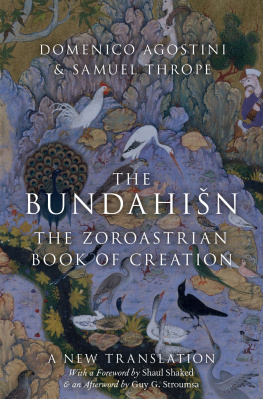
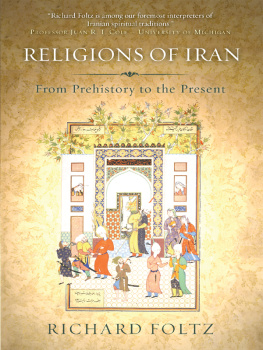
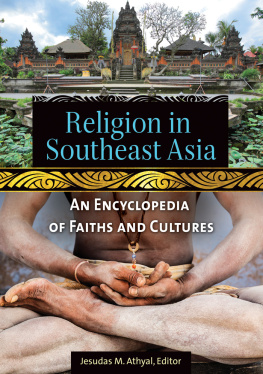
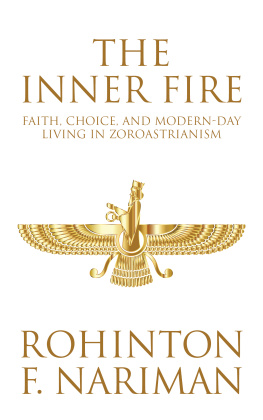
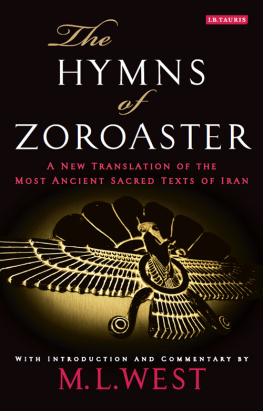
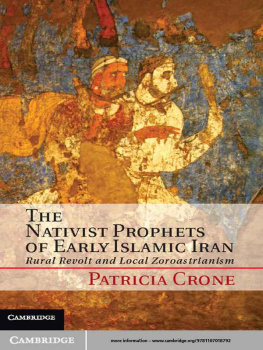
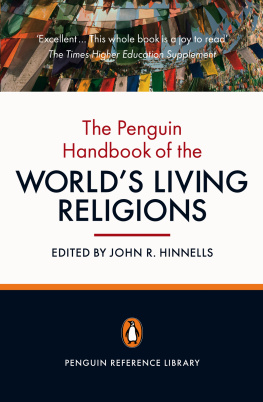




 th
th n, as opposed to many traditions, etc.). Many of the divine names probably retained their full meaning in the Old Avestan texts and have been translated here. They were probably just names already in the Young Avestan texts, where they have not been translated, for instance, Ahura Mazd
n, as opposed to many traditions, etc.). Many of the divine names probably retained their full meaning in the Old Avestan texts and have been translated here. They were probably just names already in the Young Avestan texts, where they have not been translated, for instance, Ahura Mazd